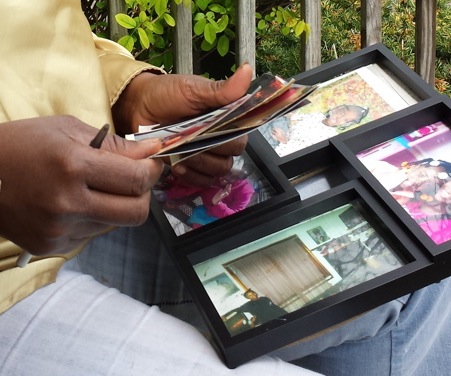Things Behind The Sun: A Dispatch From Roseland/West Pullman
By Staff in News on May 24, 2014 3:00PM

Photo by Ester Alegria
A woman with a strong face sat on the porch with a nice looking, graying man. We—myself, the woman, and the man—were about a 5-minute walk from my own apartment, in the Roseland/West Pullman community.
As I approached their steps, I'm sure the two were ready to turn down whatever I might have been selling. Tattooed and dressed mainly in the clothes that I wore to the Maximo Park show the night before we met, one wouldn't guess that I grew up in the neighborhood.
But the two beautiful smiles that greeted me calmed the head chatter, and soon I was deep in the throes of a conversation with a woman that was very much like every aunt, mother, sister, old friend, and stranger on the train I've ever encountered.
With no specific content in mind, I’d decided to let my neighbors just speak to me—to invite the sweet catharsis of the bird's background music into our banter.
I’m not good at small talk, so I started off by asking Ruth—no last name given—if she knew who’d gotten shot down the street the other day. She didn't know, but it was someone pretty young. There was constant traffic on her block, even at that early hour. I felt no fear. I was where I needed to be.
Ruth was not a welfare queen. Not ghetto. During my hours on her porch, we spoke on a wide range of topics, from her education at Columbia College, to parenting, to mental health issues, to substance abuse. I let her know that I wanted to write about the people in our neighborhood.
Not just the violence. That's already being covered. I want to know about us. We need a voice. We are constantly being counted, but our names have been revoked. And I am also very certain that the violence in this area has a great deal to do with feeling dejected, bored, useless, and thrown away.
My mind completely wandered while we spoke about mutual people we knew from the neighborhood. Then, Ruth shifted to another subject altogether, just as I had in my head.
It was then that I found strange a similarity between the two of us. I am living with bipolar disorder, and I have often had days when my thoughts and words were scattered. So, I asked. She confirmed, and I got that softening feeling that I get whenever I meet another person who shares the diagnosis.
Each of her words became even more meaningful. But, speaking to this endearing, kindhearted woman on that warm, ordinary day was anything but. I thought I was an oddity in this realm.
But now I feel such a drive to seek out another Ruth who loves her Jerome so deeply,
“I don't wanna look at my lips and say, I didn't kiss him at night, or I didn't kiss him every morning. You see, I try to capture him with compassion,” Ruth said.
She spoke about living and loving with bipolar disorder, and I noted that our struggles are universal.
“I love him whenever I can. I try to work on my health. Put me first. I wanna do it for myself. My spouse has different perplexities that he has to face.” I mentioned the relationship I have with my partner, friends, and my daughter.
We both agreed that women are tethering and powerful.
“I'm in my sisters and my sisters are in me,” Ruth said.

Photo by Ester Alegria
Ruth quickly and easily segues from mental health to her love of the women in her life to her favorite TV shows. Each of Ruth's words smoothly ran together as if she were reading past journals, now a soliloquy. I asked if she thought the crime was getting too bad, instead of her usual quick reply, she shifted her weight a bit and looked away for a few seconds.
“The government ain't as bad as they seem. If you think there's more crime now, government ain't as bad as they seem. I don't wanna be a gangster. Do you wanna be a gangster?,” Ruth said.
I had to think about this for a while. I guess I didn't understand it, really. When I got home and went over my notes, I realized that Ruth hasn't yet given up hope on democracy. In a society of skeptics, Ruth sees a glimmer of truth our country's leadership.
This woman, in the midst of so much violence, systematic poverty, and her own chemical imbalance, finds faith and wisdom and freedom and joy in even the tiniest bits of grass between her toes. True Chicago resilience.
I hope that the unexpected gunfire doesn’t startle dear Ruth while she’s tending her garden, or watching TV. I hope those bullets never get to find a target—exiting guns for a breather, only to fall flat after overexertion.
And so this is where we live.
I can see the future from my third floor window. Only the smoke clouds from those eruptions keep blocking my view.
By: Ester Alegria